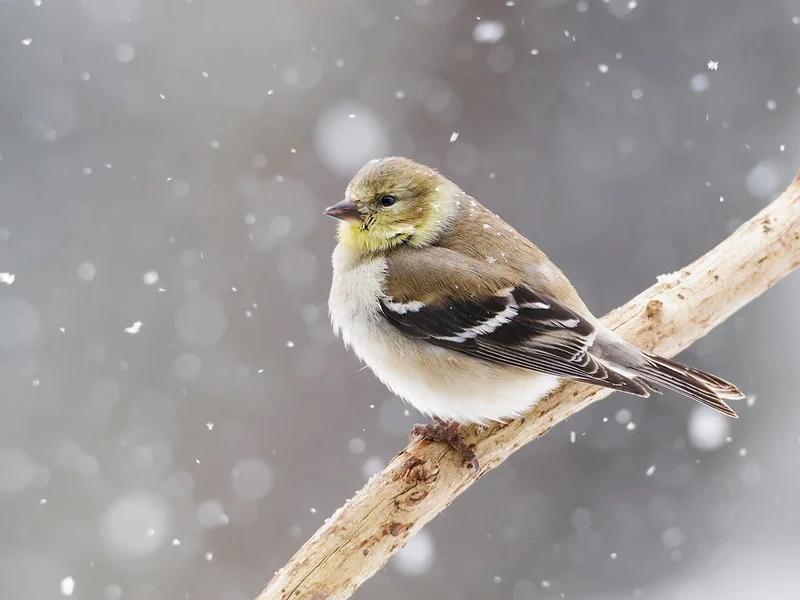As you sit inside your nice, warm house on a blustery winter day, you may notice a bird foraging in the snow. Despite its tiny size, it seems unbothered by the freezing weather. This may prompt questions to race through your mind. How do birds stay warm in cold weather? Are birds cold blooded?
Birds are not cold-blooded animals. Instead, birds are warm blooded animals. If cold blooded birds existed, they could not occupy such diverse habitats. Despite their impressive ability to flourish in seemingly any condition, birds still have their limits.
Table of Contents
Okay, so now that we know that the answer to, “Are birds cold blooded?” is no, you may wonder why birds evolved to be this way. Why are birds warm blooded? Well, keep reading as I discuss how modern birds came to be.
Why Are Birds Warm Blooded?
Okay, so birds are warm-blooded, but why? Why are birds warm blooded animals?
To understand the birds that we know and love, we have to travel back in time to when dinosaurs roamed the earth. Fans of taxonomy might know that birds are descendants of dinosaurs. However, many dinosaurs are classified as reptiles, and we know that reptiles are cold-blooded. So what gives? Are birds warm or cold blooded?

Well, birds are the descendants of a group of dinosaurs known as theropods. Theropods are a group that are identified by their bipedal nature, hollow bones, and three-clawed toes. It is impossible to know from the fossil record if these creatures were warm blooded or cold blooded animals, but some speculate that it is possible that these dinosaurs were warm-blooded.
As birds diversified into their own class, they evolved to be warm-blooded creatures and proceeded to disperse into habitats that would have previously been inhospitable. Modern birds are warm-blooded, and cold blooded birds do not exist.
How Does Being Warm-Blooded Benefit Birds?
Now you know that birds are warm-blooded because they descended from a specific lineage of dinosaurs. Great, but why are birds warm-blooded to this day? What benefits does being warm-blooded serve to birds.
Well, have you ever looked out your window in the middle of winter and admired the birds in your yard? You see, if birds were not warm-blooded, such a situation would not be possible.
Warm-blooded creatures are able to thrive when temperatures become freezing in winter, whereas cold-blooded species are not able to function in such conditions. This explains why species like puffins and penguins can thrive in frigid ocean waters.
Bird Body Temperature
Now that you know birds are warm blooded, you may be curious about a bird’s internal body temperature. Is it comparable to that of a human? While humans have an internal body temperature that stays around 98.6°F, birds have a higher metabolism and thus a higher internal body temperature.
Birds use avian thermoregulation to maintain an average internal body temperature of 105°F. This temperature is fueled by a bird’s increased metabolic rate and the need to consume food more frequently than humans. However, this high internal body temperature alone is not enough to keep warm in the winter. They also rely on several unique adaptations to help them endure.
How Do Birds Stay Warm In Cold Weather?
Let’s go back to that tiny bird foraging in the snow outside of our window. How does it do it – how do birds stay warm in cold weather?
Well, many bird species are probably not “warm” during freezing conditions, but they can nonetheless thrive in brutal weather thanks to the following physical adaptations.

Fat Reserves
Birds take advantage of ample food sources during autumn to build up reserves of fat. These fat reserves help birds endure the lean winter months when food can be hard to find. By creating a layer of fat, birds have insulation and a reserve of energy for times when the weather makes finding food difficult.
Feathers
Birds are the only creatures on the planet that have feathers. Feathers are remarkably useful, and one of their many functions includes retaining body heat during cold weather. Of course, since birds are warm blooded, they can produce their own body heat.
Some birds grow additional feathers to help keep them warm in the winter. Moreover, given the lightweight nature of feathers, birds can cover their bodies with thousands of feathers. Birds may grow several different kinds of feathers on their bodies. These different feathers serve various purposes, with some being excellent insulators. Anyone who has ever worn clothing stuffed with duck or goose down knows the remarkable warming abilities of feathers.
Scales, Legs, and Feet
Birds have specialized scales on their feet and legs that help them to retain heat. Although it may appear that scales would be rough to the touch and lack any insulating power, they help birds to lock in heat.
Meanwhile, birds have a special trick that allows them to keep their legs and feet warm. It turns out that they are capable of limiting the amount of blood that flows into their legs and feet. This ability helps to minimize heat loss to these extremities so they can focus on warming more important parts of their bodies in cold weather.
Do Birds Hibernate?
The adaptations that birds leverage to thrive in the winter are immensely impressive, but you may not be convinced that all birds can use such tactics to survive. So, are birds cold blooded in any part of the world? Or, can birds hibernate like mammals to survive the winter?
Birds are neither cold-blooded nor capable of hibernating like some mammal species. Although some believe the misconception that birds like owls hibernate, the reality is that birds are simply not as visible or vocal during the winter in many cases. Birds have evolved to be equipped with all of the adaptations and strategies that they need to endure the most freezing times of the year.
Now, some birds are not cut to spend an entire winter in subzero temperatures. For instance, a Yellow Warbler who breeds in Alaska is not going to do too well once the summer breeding season finishes up. Therefore, thousands of bird species have evolved another strategy for beating the cold: migration.

Are Cold Temperatures Dangerous For Birds?
Those who enjoy birdwatching in their backyard during the winter months may worry about the safety of their avian visitors in bad weather. Though birds are warm blooded and have adaptations to help them endure inclement weather, winter can nonetheless be a dangerous time.
Winter is especially dangerous for birds that have not evolved to live in winter weather. For instance, birds like crows will typically do well during winter, but some may get disoriented on their migrations and end up in a location that has weather in which they are not used to surviving. These cases are not common, but they happen and they can be deadly for the birds involved.
Winter can be deadly even for those that have evolved to endure the cold. If birds do not take the necessary precautions, they could die from exposure to the elements. Fortunately, such cases are rare, and birds are generally much more resilient than they look.
How Can I Help The Birds In My Backyard During Winter?
After watching the birds in your backyard during brutally cold weather, you may want to help minimize their burden during this time of year. This is a noble thought, but know that the birds will survive even without your intervention. However, if you’re determined to help your avian visitors, here are some things you can do:
-
-
Put up a bird feeder: A bird feeder offers birds a consistent source of food that can help them build fat reserves and prosper in the winter.
-
Install a heated birdbath: Water can be a difficult thing to find during the winter, so offering your avian visitors a heated birdbath is sure to be a hit.
-
-
-
Plant trees and shrubs: During cold weather, the best thing a bird can do is simply sit and conserve energy. Planting trees and shrubs offers birds a bit of shelter from the cold.
-
Conclusion
Are birds cold blooded animals? Although some believe that birds are cold blooded, we now know that birds are warm-blooded creatures that have used their physiology to disperse throughout the globe.
The idea that birds are cold blooded is simply not true, and indeed – cold blooded birds do not exist. Moreover, birds do not hibernate as some warm-blooded mammals do, and they have a unique set of adaptations that help them survive in freezing temperatures. The vast majority of the birds that you see during winter are perfectly adapted for life in the cold, so they will have no problem surviving the worst of winter.
Next time someone asks, “Are birds warm blooded?” you’ll be able to confirm their suspicion.

